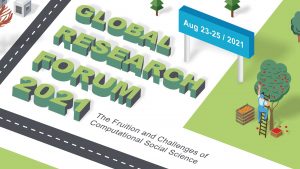Using big data to understand human behaviour
August 16, 2021

The Global Research Forum 2021 will be held from the 23rd to the 25th of August 2021. Jointly organized by the NUS Faculty of Arts and Social Science and the NUS School of Computing’s Department of Information Systems and Analytics, the theme of the forum is ‘The Fruition and Challenges of Computational Social Science’. The forum will feature multiple world-leading experts from the United States, China, Ireland and NUS discussing the challenges, potentials, and perceived future of computational social science (CSS). Some examples of subjects that will be touched on include classic social science topics such as online networks of people and content, as well as social networks more broadly defined, which then include offline relationships. More recent matters like online experiments carried out through social media, and field experiments related to Singaporeans’ water conservation and sustainable development will also be talked about over the course of the forum.
On 18th August, 2021, Professor Jack Qiu (NUS Department of Communications and New Media) and Associate Professor Tan Chuan Hoo (NUS Department of Information Systems and Analytics) were interviewed for an article on NUS News titled ‘Using big data to understand human behaviour’ to share insights on the rise of CSS and what participants can expect from the forum.
Prof Qiu explained that the widespread use of digital technologies such as smartphones and e-payment companies and the accompanied rise of big tech companies has led to increased global prominence of CSS over the past decade. The role of CSS is present in everyday life, with it being utilized for issues such as contact tracing for the COVID-19 pandemic. In fact, a majority of Singapore’s Smart Nation initiative has to do with CSS, which aids in urban planning and construction of roads and residential neighbourhoods.
In the next five to ten years, Prof Qiu expects the field to become more transparent about data capture and the ethics of collaboration and automated decision-making. While CSS is often criticized to be too data-driven, experimental design, which is a tool Prof Qiu believes should receive more attention, emphasizes theoretical development and simplicity in modelling. He mentions that the new NUS College of Humanities and Sciences (CHS) could be one new place where humanistic thinking and computational approaches can come together to elevate CSS to another level. In a time where pressing issues such as COVID-19, misinformation or environmental sustainability need to be addressed, interdisciplinary collaboration through CSS emerges as an integral tool to combat them.
Read the article in NUS News here.
